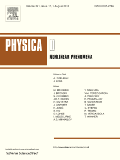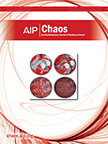
Journal of the Royal Society Interface
metrics 2024
Advancing Knowledge Across Boundaries
Introduction
Journal of the Royal Society Interface is a premier interdisciplinary journal dedicated to the convergence of life sciences, physical sciences, and engineering. Published by the esteemed Royal Society in the United Kingdom, this journal serves as a dynamic platform for innovative research that pushes the boundaries of both fundamental and applied science. With a significant impact factor and ranked in the prestigious Q1 category across multiple domains, including Biochemistry, Bioengineering, and Biomedical Engineering, the journal consistently prioritizes high-quality contributions that innovate and inspire. Accessible to researchers, professionals, and students alike, it aims to cultivate a deeper understanding of complex interactions and synergies among biological and physical systems. From its inception in 2004 to its evolving knowledge contributions through 2024, the Journal of the Royal Society Interface plays a pivotal role in shaping future research directions and fostering collaboration across scientific domains.
Metrics 2024
 1.10
1.10 3.70
3.70 4.00
4.00 168
168Metrics History
Rank 2024
Scopus
IF (Web Of Science)
JCI (Web Of Science)
Quartile History
Similar Journals

JOURNAL OF THEORETICAL BIOLOGY
Transforming Theoretical Concepts into Practical SolutionsJOURNAL OF THEORETICAL BIOLOGY, published by Academic Press Ltd - Elsevier Science Ltd, stands as a pivotal source of scholarly research in the domains of theoretical and applied biological sciences. Since its inception in 1961, this esteemed journal has contributed significantly to the advancement of knowledge across various fields, including agricultural sciences, applied mathematics, biochemistry, genetics, immunology, and medical research. With a commendable Q2 ranking in multiple categories for 2023, it showcases robust impact throughout the academic community, reflected in its high Scopus rankings, which place it in the top 25% of journals in several categories. The journal's commitment to fostering interdisciplinary research supports its objective of bridging theoretical frameworks with practical applications, making it an essential resource for researchers, professionals, and students alike. With its wide-ranging topics and a keen focus on innovation, the JOURNAL OF THEORETICAL BIOLOGY is indispensable for those seeking to explore the complexities of biological systems and their mathematical modeling.

Applied Mechanics Reviews
Advancing the Frontiers of Mechanical Engineering.Applied Mechanics Reviews, a prestigious journal published by ASME (American Society of Mechanical Engineers), is an essential resource in the field of mechanical engineering. With an impact factor reflecting its high relevance and rigorous peer-review process, this journal holds a commendable Q1 ranking in the 2023 category quartiles and is positioned at an impressive rank of #7 out of 672 in Scopus rankings, placing it in the 99th percentile. The journal, with an ISSN of 0003-6900 and E-ISSN of 2379-0407, serves as a vital platform for the dissemination of groundbreaking research, offering a comprehensive overview of applied mechanics, spanning theoretical developments to practical applications. Although it does not provide open access options, the insights published within these pages are invaluable for researchers, professionals, and students eager to enhance their knowledge and stay abreast of the latest advancements. With volumes dating back to 1965 and continuing through 2024, Applied Mechanics Reviews remains a cornerstone of the mechanical engineering community, fostering innovation and collaboration across various domains of engineering.

PHYSICA D-NONLINEAR PHENOMENA
Exploring the Frontiers of Nonlinear DynamicsPHYSICA D-NONLINEAR PHENOMENA, published by Elsevier, serves as a leading academic journal at the forefront of the fields of Applied Mathematics, Condensed Matter Physics, Mathematical Physics, and Statistical and Nonlinear Physics. With an impressive track record since its inception in 1980, this journal has maintained a distinguished presence, noted for its Q1 ranking in multiple categories in 2023, showcasing its impact and relevance in the scientific community. The journal's commitment to advancing knowledge is reflected not only in its rigorous peer-reviewed articles but also through its high visibility and accessibility, aiding researchers, professionals, and students in staying abreast of the latest developments in nonlinear phenomena. Located in Amsterdam, Netherlands, PHYSICA D-NONLINEAR PHENOMENA is essential for those seeking to explore innovative research and contribute to groundbreaking discoveries in the realm of nonlinear dynamics.

Journal of Biomimetics Biomaterials and Biomedical Engineering
Transforming Nature's Wisdom into Engineering MarvelsThe Journal of Biomimetics Biomaterials and Biomedical Engineering, published by TRANS TECH PUBLICATIONS LTD, stands at the forefront of interdisciplinary research that merges biology with engineering to address real-world challenges in healthcare and material science. Since its inception in 2014, the journal has contributed valuable insights into the development of innovative biomaterials and biomedical applications, showcasing research excellence in its fields, including biotechnology and bioengineering. With an ISSN of 2296-9837 and an E-ISSN of 2296-9845, this journal provides a platform for both emerging and established researchers to disseminate their work, fostering knowledge transfer across the global scientific community. Currently positioned in the Q4 quartile across categories such as Bioengineering, Biomedical Engineering, and Biotechnology, it aims to enhance its impact through open-access policies and rigorous peer-review processes. With its headquarters in Germany, the journal welcomes diverse contributions from around the world, shaping the future of biomimetic technologies and advancing our understanding of complex biomedical systems.

Ecological Complexity
Bridging the gap between ecology and environmental science.Ecological Complexity is a prestigious academic journal published by Elsevier, dedicated to advancing the understanding of complex ecological systems through innovative modeling and analysis. With an ISSN of 1476-945X and an E-ISSN of 1476-9840, this journal has been a critical platform for researchers since its inception in 2004, with a forecasted operation until 2024. The journal enjoys an esteemed Q2 ranking in both the Ecological Modeling and Ecology, Evolution, Behavior and Systematics categories as of 2023, highlighting its significant impact and relevance in the field. Additionally, it ranks impressively in Scopus, with 85th out of 721 in the Ecology category and 11th out of 41 in Ecological Modeling, illustrating its commitment to high-quality research dissemination. While it does not currently offer Open Access options, Ecological Complexity remains a vital resource for ecologists, environmental scientists, and interdisciplinary researchers aiming to deepen their understanding of ecological interactions and systems. The journal is based in the Netherlands at RADARWEG 29, 1043 NX, AMSTERDAM, and serves as an essential forum for fostering innovative research that bridges theoretical concepts and practical applications in ecology.

Complex Systems
Innovating Understanding Across Diverse DomainsComplex Systems is a pivotal journal published by Complex Systems Publications Inc, specializing in the interdisciplinary field of complex systems science. With an ISSN of 0891-2513, it focuses on advancing the understanding of complex phenomena across various domains, including computer science and control engineering. Operating from the United States, this journal has established itself as a credible source with a current impact factor reflecting its relevance—ranking in the Q3 category for both Computer Science (miscellaneous) and Control and Systems Engineering as of 2023. Although it does not offer Open Access, Complex Systems aims to facilitate the exchange of cutting-edge research and innovative methodologies, making it indispensable for researchers, professionals, and students eager to explore and contribute to the field. With coverage spanning from 2012 to 2024, it strives to foster a deeper understanding of the principles governing complex systems, thus paving the way for future technological advancements and theoretical developments.

Biophysics Reviews
Exploring the Interplay of Biochemistry and PhysicsBiophysics Reviews, published by AIP Publishing, is an emerging journal in the field of biophysics, aiming to bridge the gap between fundamental biophysical research and applied sciences. With an ISSN of 2688-4089, this journal provides a critical platform for the dissemination of high-quality reviews covering the interplay between biochemistry, molecular biology, biotechnology, and materials science. As of 2023, it provides essential insights for researchers and professionals interested in understanding biomolecular processes at a physical level. Although the journal is not currently open access, it is making strides in establishing its impact in the competitive landscape, as indicated by its Scopus rankings in various related fields, including biochemistry and bioengineering. With a focus on enhancing collaborations among scientists and practitioners, Biophysics Reviews is poised to become a vital resource for anyone looking to deepen their understanding of how biophysical principles can be applied to solve complex biological challenges.

ACTA BIOTHEORETICA
Exploring the Frontiers of Knowledge Across DisciplinesACTA BIOTHEORETICA is a distinguished academic journal published by Springer, offering a vital platform for the dissemination of research within various interdisciplinary fields including Agricultural and Biological Sciences, Applied Mathematics, Biochemistry, Genetics and Molecular Biology, Environmental Science, and Philosophy. The journal, with its extensive history since its inception in 1935, holds a significant impact factor within its respective categories, ranking Q2 in Agricultural and Biological Sciences and Q1 in Philosophy as of 2023. Its archives, spanning from historical publications to contemporary studies, serve as a rich repository for scholars, professionals, and students dedicated to advancing knowledge in these areas. ACTA BIOTHEORETICA invites contributions that push the boundaries of theoretical exploration and practical application, with the aim of fostering an understanding that bridges science and philosophy. Although not open access, the journal maintains wide accessibility through its integrated digital platforms, enhancing the reach and impact of published work worldwide. Its central office located in Dordrecht, Netherlands further accentuates its international appeal and significance.

CHAOS
Exploring the Intricacies of Complex SystemsCHAOS, an esteemed journal published by AIP Publishing, is a cornerstone of interdisciplinary research, focusing on the intricate dynamics of complex systems across various scientific domains. With a balanced impact factor, this journal emphasizes high-quality contributions in Applied Mathematics, Mathematical Physics, and Statistical and Nonlinear Physics, while also exploring intersections with Medicine and Physics and Astronomy. With rankings showing a remarkable percentile placement, notably #7 in Mathematical Physics and #10 in Statistical and Nonlinear Physics, CHAOS has established itself as a leading platform for disseminating groundbreaking research since its inception in 1991. This journal not only aims to foster collaboration among scientists but also to advance theoretical and computational frameworks that unravel the complexities of chaotic systems. Researchers, professionals, and students alike will find rich insights and innovative theories within its pages, making it an invaluable resource in the pursuit of knowledge and understanding in the modern scientific landscape.

BIOLOGICAL CYBERNETICS
Exploring the Intersection of Biology and TechnologyBIOLOGICAL CYBERNETICS is a premier journal published by SPRINGER, dedicated to advancing the fields of biotechnology and computer science through the lens of biological interactions. With an ISSN of 0340-1200 and an E-ISSN of 1432-0770, this esteemed journal has been a cornerstone of academic research since its inception in 1961 and is set to continue influencing the landscape of biological cybernetics through 2024. The journal currently holds a Q3 ranking in the Biotechnology category and a Q2 ranking in miscellaneous Computer Science according to the 2023 category quartiles, showcasing its credibility and impact in the interdisciplinary nexus of these fields. Although it does not provide open access options, researchers and students can engage with its innovative content that includes original research articles, reviews, and methodologies that explore the computational modeling of biological systems and the integration of artificial intelligence in biological research. With its strategic location in the United States and a robust publication record, BIOLOGICAL CYBERNETICS remains an essential resource for anyone looking to deepen their understanding and application of cybernetic principles within biological contexts.